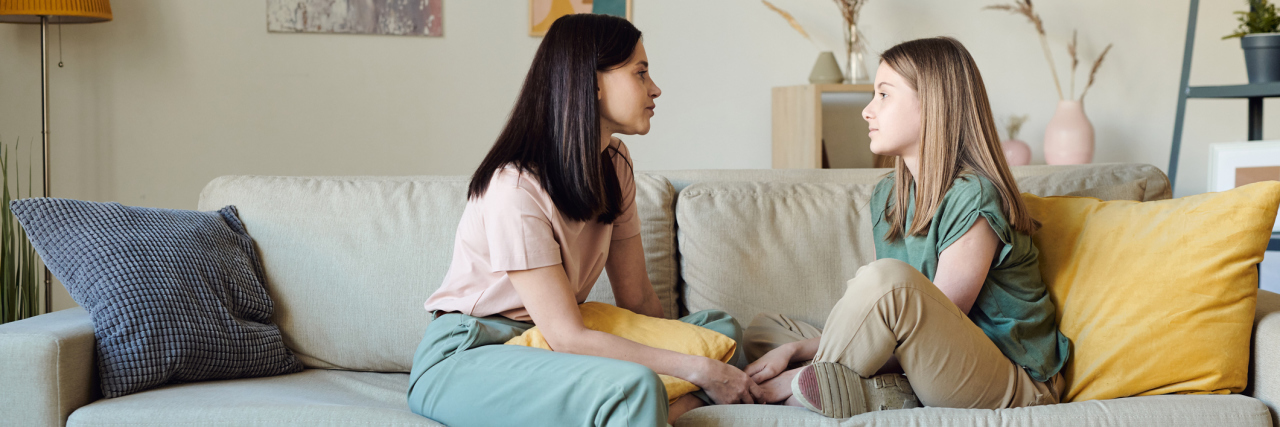What I Would Tell My Younger Self, Depressed in the Psych Ward
I’ve seen a bunch of videos based on this TikTok meme: Bittersweet background music plays while a person pretends to talk to their younger self. The older self tells the younger self what happened to them. Loss of loved ones, career success. The younger self reacts with relief and shock, the older self nods knowingly. And there is always a twist: Life is better off, but not in the ways the younger self expected.
• What is Bipolar disorder?
I have no desire to talk to my younger self. I don’t want to see her. I can’t summarize the last 13 years with a hopeful punchline. I can organize my life into the familiar beats — graduation, marriage, baby on the way — but, unlike the people in the videos, I don’t believe I’ve changed much. Minus the husband and medicine, I’m one lifeline away from climbing back into bed for months.
But lately I’ve realized I need to tell my younger self something important. Something that could change our lives. So, here I am, standing outside the psych hospital cafeteria in 2008, waiting for the 18-year-old girl with dull eyes and stained sweatpants. I tap her shoulder, waiting for her to recognize me, and she only stares.
“I’m you from the future,” I say.
She doesn’t smile. “I’m alive?”
“Yes, yes, I’m 32 years old.”
She’s not looking at me. She shuffles in her hospital socks and stuffs two Jell-O cups into her robe. “Am I still depressed?” she asks.
“Sometimes,” I say. This is why I didn’t want to see her. “But now mostly you have problems with anxiety.”
Her shoulders slump. I start to worry. I didn’t think about what would happen if I made my younger self worse.
“But even when you’re anxious or depressed, you don’t stay in bed by yourself,” I say. “You’re not alone anymore. You go out with your friends or your husband. Or you go to the park across the street.”
She doesn’t look impressed. I knew she’d be like this. She shrugs and starts walking down the hallway, socks sliding a little on the linoleum. I pull at her sleeve.
“Listen, Marie,” I say. “I need to tell you something.”
She turns, and I have to look away from her face, completely still where there should be vitality, unsurprised at the misery she’s caught in. Her skin is too pale. I wish I never came.
“You don’t need to keep everybody’s secrets,” I say. “You don’t need to protect them all the time.”
She closes her eyes.
“I know what they’ve told you, that you’re lazy and bad,” I say. “But they’re wrong, and you can talk about what happened to you — to us. You have to.”
I don’t know how much to say. I don’t want to scare her off. In her future, my past, I’d sit in doctors’ or therapists’ offices for seven years and lie. I’d make up answers to questions, avoid their eyes. I shrugged when family friends asked me what happened. I didn’t want anyone who hurt me to get into trouble.
When I finally did open up, gasping in the middle of a panic attack during a hospital stay in college, my confidant said nothing at all. He was a medical resident who cheered me up every day with his staggering good looks.
“Why aren’t you saying anything?” I asked him.
He muttered something about respecting my experiences and left.
Years later, my therapist guessed what had happened. Sinking into the couch, I nodded. I stared at the carpet, and the room blurred. But with our conversations, the gagging desperation slowly cleared. I fixed relationships, stayed out of bed.
Back in the psych hospital with my past self, her jaw tightens now. I can’t tell if she’s angry. I half-expect her to defend them, spit insults back at me. I don’t know how to reach her. Maybe there’s no other way forward through the 13 years. Her eyes open.
“Did you say I live by a park?” she asks.
“Oh, it’s beautiful,” I say.
I tell her about the green concert lawn, the arching metal roof overhead, the huge square fountains, rows of curving trees. The stone pots overflowing with pink flowers in the spring, the matted orange leaves in fall. The twisted bridge to the children’s playground. She’s listening.
“I can walk there?” she asks. “In five minutes?”
“Less,” I say.
She nods. She’s thinking.
“Have you ever had a picnic in the park?” she asks.
I think I’ll come back around Valentine’s Day, knock on the door of her bedroom while she’s sleeping, and I’ll tell her about the skating rink, how we sip hot cocoa while watching the skaters spin around the icy loop. My husband and I don’t know how to skate, but we clap and point at the best skaters. Anyway, we’ll have a stroller to push around the loop by then, and a baby sitting in the stroller, and I think I’ll tell her about that, too.
Getty image by shironosov

